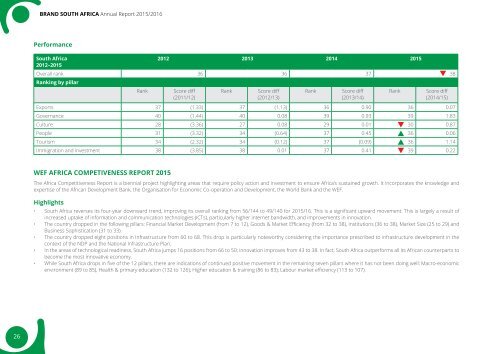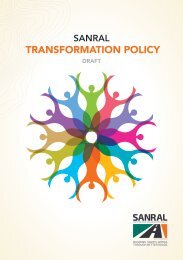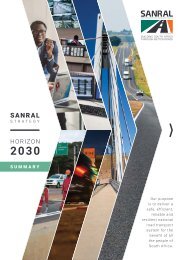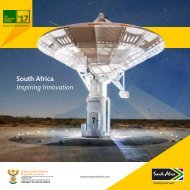Brand-South Africa - Annual report 2015 - 2016
During the past financial year, aligned with its mandate to build pride and patriotism in the Nation Brand, Brand South Africa has worked on initiatives to encourage active citizenship in partnership with its stakeholders in government, business, civil society and identified influential forums to increase the participation of all people, particularly our young people, in building a strong, cohesive Nation Brand. These activities, together with engagements at provincial level on Nation Brand alignment, contribute to social cohesion and a positive Nation Brand. Brand South Africa’s activities took place under the leadership of its new CEO, Amb. Kingsley Makhubela, PhD, who joined the organisation during the year.
During the past financial year, aligned with its mandate to build pride and patriotism in the Nation Brand, Brand South Africa has worked on initiatives to encourage active citizenship in partnership with its stakeholders in government, business, civil society and identified influential forums to increase the participation of all people, particularly our young people, in building a strong, cohesive Nation Brand. These activities, together with engagements at provincial level on Nation Brand alignment, contribute to social cohesion and a positive Nation Brand.
Brand South Africa’s activities took place under the leadership of its new CEO, Amb. Kingsley Makhubela, PhD, who joined the organisation during the year.
Create successful ePaper yourself
Turn your PDF publications into a flip-book with our unique Google optimized e-Paper software.
and south africa <strong>Annual</strong> Report <strong>2015</strong>/<strong>2016</strong><br />
Performance<br />
<strong>South</strong> <strong>Africa</strong><br />
2012 2013 2014 <strong>2015</strong><br />
2012–<strong>2015</strong><br />
Overall rank 36 36 37 38<br />
Ranking by pillar<br />
Rank<br />
Score diff<br />
(2011/12)<br />
Rank<br />
Score diff<br />
(2012/13)<br />
Rank<br />
Score diff<br />
(2013/14)<br />
Rank<br />
Score diff<br />
(2014/15)<br />
Exports 37 (1.33) 37 (1.13) 36 0.90 36 0.07<br />
Governance 40 (1.44) 40 0.08 39 0.93 39 1.83<br />
Culture 28 (3.36) 27 0.08 29 0.01 30 0.87<br />
People 31 (3.32) 34 (0.64) 37 0.45 36 0.06<br />
Tourism 34 (2.32) 34 (0.12) 37 (0.09) 36 1.14<br />
Immigration and investment 38 (3.85) 38 0.01 37 0.41 39 0.22<br />
WEF <strong>Africa</strong> Competiveness Report <strong>2015</strong><br />
The <strong>Africa</strong> Competitiveness Report is a biennial project highlighting areas that require policy action and investment to ensure <strong>Africa</strong>’s sustained growth. It incorporates the knowledge and<br />
expertise of the <strong>Africa</strong>n Development Bank, the Organisation for Economic Co-operation and Development, the World Bank and the WEF.<br />
Highlights<br />
• <strong>South</strong> <strong>Africa</strong> reverses its four-year downward trend, improving its overall ranking from 56/144 to 49/140 for <strong>2015</strong>/16. This is a significant upward movement. This is largely a result of<br />
increased uptake of information and communication technologies (ICTs), particularly higher internet bandwidth, and improvements in innovation.<br />
• The country dropped in the following pillars: Financial Market Development (from 7 to 12), Goods & Market Efficiency (from 32 to 38), Institutions (36 to 38), Market Size (25 to 29) and<br />
Business Sophistication (31 to 33).<br />
• The country dropped eight positions in Infrastructure from 60 to 68. This drop is particularly noteworthy considering the importance prescribed to infrastructure development in the<br />
context of the NDP and the National Infrastructure Plan.<br />
• In the areas of technological readiness, <strong>South</strong> <strong>Africa</strong> jumps 16 positions from 66 to 50; innovation improves from 43 to 38. In fact, <strong>South</strong> <strong>Africa</strong> outperforms all its <strong>Africa</strong>n counterparts to<br />
become the most innovative economy.<br />
• While <strong>South</strong> <strong>Africa</strong> drops in five of the 12 pillars, there are indications of continued positive movement in the remaining seven pillars where it has not been doing well: Macro-economic<br />
environment (89 to 85), Health & primary education (132 to 126); Higher education & training (86 to 83); Labour market efficiency (113 to 107).<br />
26











